|
December 13, 2021 - No. 119
Quebec Daycare Workers Ratify Collective Agreements
Vigorous Mass Struggle in Defence of Workers' Rights and Services
for the People 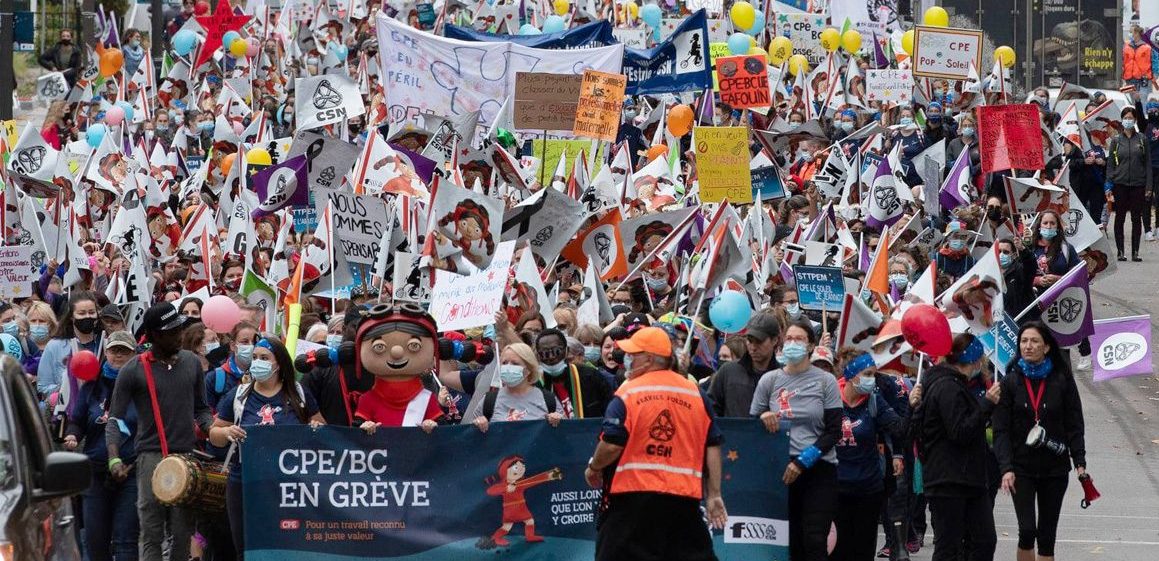
Post-Secondary Educators in Alberta
• Concordia University Edmonton Faculty Association Votes to Strike
Demand for Government and Employer Respect for Rights of BC
Hospitality Workers
• Broad Support for Hotel Workers' Fight for an End to Pandemic Terminations
• Workers Hold Breakfast Rally Demanding Daily Room Sanitizing at
Pinnacle Hotel
Quebec Daycare Workers Ratify Collective Agreements
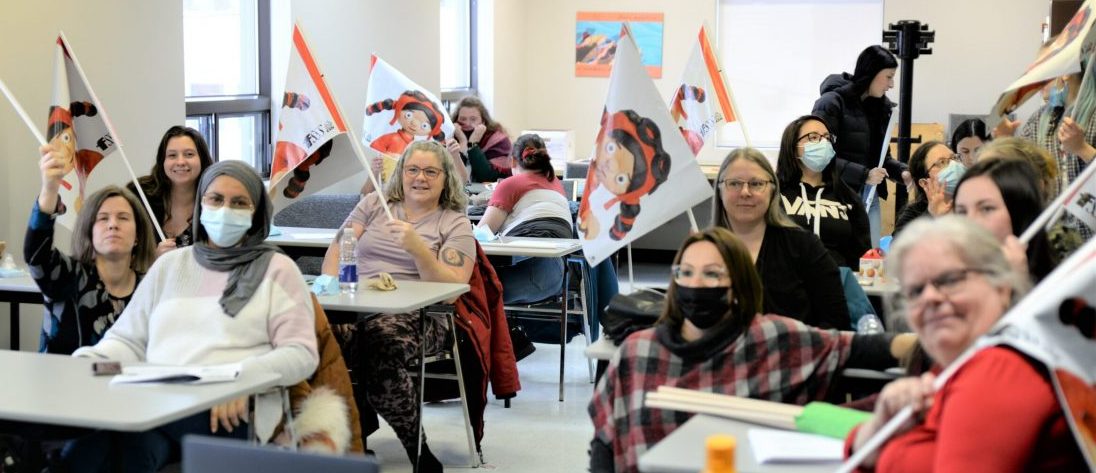
Striking daycare workers in Quebec return to their jobs today. The
Early Childhood Centres (ECC) sector of the Health and Social Services
Federation of Unions (FSSS-CSN) announced on December 12 that,
following dozens of general assemblies held between December 9 and 11,
the 11,000 ECC workers unionized with the Federation
voted 95 per cent in favour of adopting the tentative agreement reached
on December 8 between the government and the Federation's
representatives. This puts an end to the unlimited general strike that
started on December 1.
 Also on December 12, the Quebec Early Childhood Workers' Federation (FIPEQ-CSQ)
announced that the 3,200 daycare workers it represents voted 95.5 per
cent in general assemblies in support of adopting the December 8
tentative agreement. FIPEQ members had suspended their decision to go
on strike on December 9, while awaiting the vote results
on the tentative agreement. Also on December 12, the Quebec Early Childhood Workers' Federation (FIPEQ-CSQ)
announced that the 3,200 daycare workers it represents voted 95.5 per
cent in general assemblies in support of adopting the December 8
tentative agreement. FIPEQ members had suspended their decision to go
on strike on December 9, while awaiting the vote results
on the tentative agreement.
The Syndicat des Métallos/United Steelworkers (USW) also announced
that workers at two ECCs it represents in Rouyn-Noranda in Abitibi and
Port-Cartier on the North Shore have ended their general strike begun
October 13, after voting 100 per cent in favour of the tentative
agreement reached with the government.
The Service Employees Union of Quebec (SQEES), an affiliate of the
Quebec Federation of Labour, has also reached a tentative agreement
that will be presented to its members later this week.
Although the unions were not negotiating in a common front, their demands and the gains they have made are similar.
Qualified educators and specialized educators have obtained a wage
increase of up to 18 per cent over three years, which brings their
wages more in line with what educators in schools are earning. For
staff in other job categories, such as educational consultants, food
service managers and disinfection and cleaning personnel, wage
increases
range from eight to 12.5 per cent, depending on the job category. The
government had initially offered them only six per cent.
In addition, workers will be receiving a recognition bonus of three
per cent of their pay for hours worked between April 1, 2020 and March
31, 2021.
The new collective agreement also provides for an additional three
hours dedicated to the preparation of the child's portfolio, as well as
measures improving the working conditions of food service workers. It
also restores two paid holidays and provides for the creation of a
committee whose mandate is to identify the difficulties experienced by
educators in integrating children with special needs.
However, the serious issue of child-to-educator ratios remains
unresolved. In the school system, there is a ratio of teachers to
children, based on age. For childcare centres the Ministry of Families
established a ratio of staff members to children, based on age, with a
staff member defined as someone "assigned to the implementation of the
educational program for the children" but the way the ratio is applied
in many of the centres is as a "building ratio," the ratio of all the
workers in the building to the number of children, irrespective of the
fact that many of those workers do not have any contact with the
children.
With their fight the workers' aim is to resolve the problem of
attracting and retaining staff and ensuring the sustainability of the
daycare centres, which has been threatened by the unacceptable
conditions imposed on workers for many years. They thanked parents for
their support throughout their mass actions to obtain satisfaction for
their just
demands.
Workers' Forum congratulates the daycare workers for their
determined mass struggle in defence of their rights and of the services
provided to the population. 
Post-Secondary Educators in Alberta
On December 1, members of the Concordia
University (Edmonton) Faculty Association (CUEFA) voted just over 90
per cent in favour of strike action with 77 out of 81 members voting.
The bargaining unit includes full-time faculty, lab instructors,
librarians and placement-coordinators (education). At this time, the
many contract faculty at Concordia are not members of CUEFA.
Concordia is a small private university in Alberta with five
faculties and 2,333 students. Concordia offers Arts, Science and
Management undergraduate degree programs, as well as Graduate degree
programs in Education, Information Technology, Information Security,
and Psychology. Concordia was founded in 1921 by the Lutheran Church
-- Missouri Synod but in 2015 it effectively self-identified as a secular
institution.
The overwhelming strike vote means that CUEFA members now have the
option to choose to strike in the next 120 days. The current collective
agreement expired June 30, 2021. The bargaining committee plans to
continue bargaining and will share further plans and developments as
they happen. On December 6, the Alberta Labour Board
gave Concordia University permission to lock out the faculty.
The main issue being bargained is instructor workload. It is
currently significantly higher than at any other university in Canada. To
provide further information to members, students, and the public, CUEFA
has created a space for "Recent Questions" on the faculty website. It
currently displays seven questions and CUEFA’s answers which were
posted after the University publicly announced that the faculty were
taking a strike vote and before the vote was concluded.
Why Is the Faculty Association Going on Strike?
"The Faculty Association is holding a strike vote, which may
potentially lead to a strike. We are seeing if there is support among
the Faculty Association members for job action given where things sit
in the collective bargaining process. A strike vote does not
necessarily mean a strike is inevitable."
Why Would Faculty Be at the Point of Holding a Strike Vote?
"We have been bargaining with the University for a number of months.
While we are making progress on a number of parts of the agreement, we
stalled on Workload in August. We went to mediation, where we bring in
a labour expert to work with both sides on the issue. There was no
movement and despite asking, no response to revisiting
the article beyond what was last offered."
What Are the Biggest Issues?
"Workload, as mentioned above, is the biggest issue for the Faculty.
Currently the workload is significantly higher than at any other
university in Canada. The bargaining team for the Association asked for
a streamed approach, where some faculty would stay at the current
teaching load (4 courses a term) but have no required research
component and some faculty would have a lower teaching load (3 courses
a term) and would have research requirements. We understand that having
to fill those courses with instructors would cost money, and so said
that we would be flexible on how many Faculty they could move to the
lower teaching load. The University offered a 4-3 teaching
load (so four courses one term, and three the other) but increased
research for everyone. While there is less teaching involved here,
there are increased research expectations meaning that workload itself
does not improve, it is just moved around.
"Language was also introduced into the Discipline article that allows
the University to discipline members for no cause. Currently there must
be just cause to initiate any disciplinary action, up to and including
dismissal (or firing).
"Generally, when discussing a package, you want the whole picture.
The university will not present any proposal or language on Salary and
Benefits. The Faculty Association provided our proposal as a part of
our initial proposal package back in June."
Why Did We Hear About a Strike Vote from the President?
"The bargaining team made the decision to not tell the students about
the impending strike vote. We do not know what the results of the
strike vote may be so it is rather premature. As well, we know what an
odd and stressful term this has already been for students and did not
believe that the added anxiety that may be caused by this was
needed at the end of term and before exams without even knowing what
the results might be."
What Happens if the Faculty Vote YES?
"Then the Faculty Association Executive has been given a mandate from
the members that they are not happy with the current state of
negotiations. We have continually kept the members updated on
bargaining and the offers from the University. If we have a mandate,
then we continue to bargain with the University, hoping that we can
come to
some middle ground that works for both sides. If the University will
not continue to bargain with us or will not work with us on the
articles that are of utmost importance to our members, then we have the
right, under the Labour Code of Alberta, to go on strike. We would have
to give 72 hours notice to the University. A strike notice can be
cancelled right up until the moment that the strike starts. A strike
can be cancelled whenever an agreement can be made between both sides."
What Does this Mean for Students?
"It is our goal to keep any disruption to students to a minimum. We
understand the stress and anxiety that may come from this, but we still
do not know the results of the strike vote. We are hoping for a
productive bargaining process where we can come to agreements with the
administration. We do not want to strike, but the current Workload
offer from the University is detrimental to the well-being of our
current Faculty and will cause severe issues with both retention of our
faculty as well as recruitment of new faculty."
So, Has Bargaining Stopped?
"The Faculty Association is fully committed to continued bargaining
with the University regardless of the outcome of the strike vote. We
provided an initial proposal to the University outlining all changes we
hoped to bargain in the Collective Agreement. The proposal we received
in return from the University was a commentary on the
intention to make changes but very little information on the specifics
that they are asking for. The chart on the University website is very
misleading as there has been language provided on every article that we
have proposed changes for."
Everyone in post-secondary education -- faculty, staff, students --
should support the Concordia University (Edmonton) Faculty Association.
With their strike vote, they are defending their rights and those of
their students, pointing out that their working conditions are
students' learning conditions. They are also standing up and fighting
for the
public education system upon which the whole society depends.

Demand for Government and Employer Respect for Rights
of BC Hospitality Workers
UNITE HERE! Local 40 which represents thousands of hospitality
workers in BC, held a press conference in Vancouver on December 3 to
release a new report entitled Unequal Women -- Report on the Impact of pandemic Terminations on Women of Colour in B.C.'s Hospitality Industry.
The press conference was addressed by
UNITE HERE! Local 40 spokespersons and members and Vancouver City
Councillor Jean Swanson, Single Mothers' Alliance spokesperson Viveca
Ellis, Mahtab Laghaei of Women Transforming Cities and Vancouver and
District Labour Council spokesperson Seema Ahluwalia.
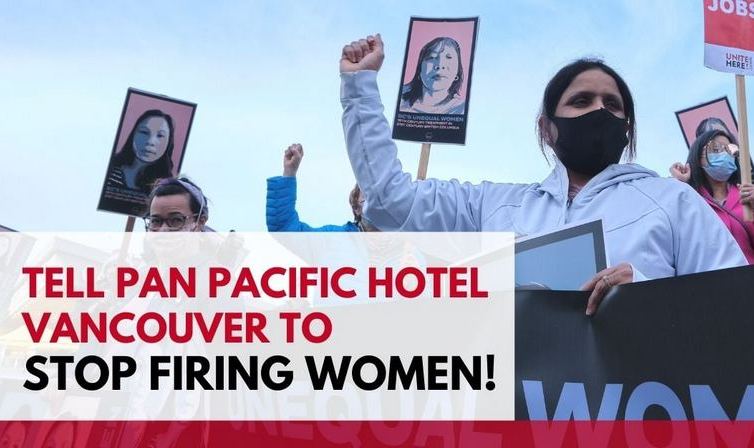 The
report is based on investigations done by the union at five BC Hotels,
the Pan Pacific, Pacific Gateway and Hilton Metrotown in Greater
Vancouver, the Coast Bastion in Nanaimo and the Coast Victoria
Harbourside in Victoria. All these hotels have taken advantage of the
pandemic-related closures to terminate hundreds of workers,
refusing to negotiate extensions of recall provisions in collective
agreements as dozens of other hotels have done. The investigation
revealed that women accounted for the majority of workers terminated at
each hotel, and that in four of the five hotels women of colour comprised the
majority of the terminated women workers. Many of the terminated
workers have worked for the hotels for decades. The aim of the
employers is to get rid of both the workers and the wages and working
conditions that have been negotiated over many years. The
report is based on investigations done by the union at five BC Hotels,
the Pan Pacific, Pacific Gateway and Hilton Metrotown in Greater
Vancouver, the Coast Bastion in Nanaimo and the Coast Victoria
Harbourside in Victoria. All these hotels have taken advantage of the
pandemic-related closures to terminate hundreds of workers,
refusing to negotiate extensions of recall provisions in collective
agreements as dozens of other hotels have done. The investigation
revealed that women accounted for the majority of workers terminated at
each hotel, and that in four of the five hotels women of colour comprised the
majority of the terminated women workers. Many of the terminated
workers have worked for the hotels for decades. The aim of the
employers is to get rid of both the workers and the wages and working
conditions that have been negotiated over many years.
Both the federal government and the provincial government have
failed to respond to repeated requests that they take action to ensure
the job security of the workers. The provincial government has refused to amend the Employment Standards Act
to extend the time that an employer must keep a worker laid off due to
lack of work on the list to be recalled until the pandemic is over.
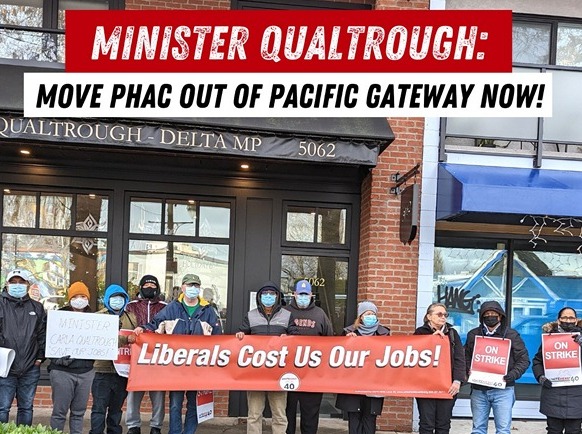 For
its part, the Federal government is directly responsible for the
termination of over 100 workers, 90 of them women, at the Pacific
Gateway Hotel which is near the Vancouver airport and is contracted by
the Federal government as a quarantine site for people flying into the
country. The Red Cross was contracted by the federal government
to take over the workers' jobs and all appeals to the Trudeau
government to have the laid off and fired workers reinstated have gone
unanswered. For
its part, the Federal government is directly responsible for the
termination of over 100 workers, 90 of them women, at the Pacific
Gateway Hotel which is near the Vancouver airport and is contracted by
the Federal government as a quarantine site for people flying into the
country. The Red Cross was contracted by the federal government
to take over the workers' jobs and all appeals to the Trudeau
government to have the laid off and fired workers reinstated have gone
unanswered.
Vancouver City Councillor Jean Swanson said that "The BC government
needs to do the right thing here and stand up for racialized women.
Stop the discrimination against racialized women by these hotels. Stop
allowing the hotels to push women into poverty. The solution is easy
and costs virtually nothing: change the Employment Standards
Act to extend recall rights to when the pandemic is over."
Speaking on behalf of the Vancouver and District Labour Council,
Seema Ahluwalia expressed solidarity with the hospitality workers and
their union. She said, "The Unequal Women report exposes the ugly agenda
of the hotel industry to destroy sustainable jobs and replace them with
low-paid, precarious work. Indigenous and racialized women
are the backbone of the service sector where most job losses have
occurred during the pandemic. This is an urgent call to support our
union and non-union sisters, demand that the government hold the hotel
industry accountable for the billions in welfare dollars they have
received, and work together to prevent the hotel industry from
impoverishing
more families and communities."
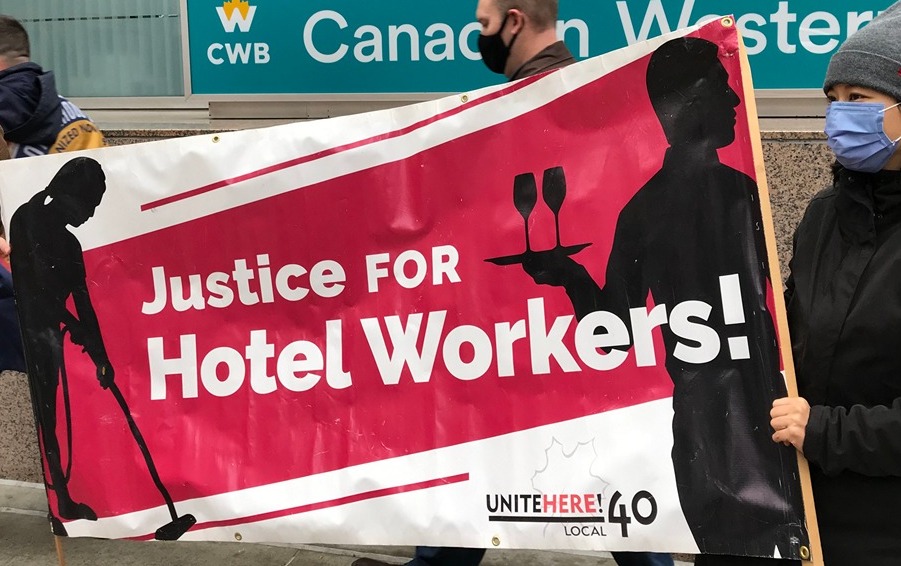 The
report recommends that the BC government follow the lead of
other governments to ensure that no employer can terminate long-term
staff as a result of the pandemic and that federal leaders should
condition employers' pandemic subsidies on workers' retention to ensure
laid-off workers' jobs are protected. The report points out that
"Since the onset of COVID-19, the hospitality industry has lobbied all
levels of government for public relief. The provincial government has
provided the sector with close to $230 million in direct relief since
December 2020, along with access to $345 million in grants. BC's
hospitality sector also received more than $1.2 billion in wage
subsidies
from the federal government between March 2020 and May 2021. The
report recommends that the BC government follow the lead of
other governments to ensure that no employer can terminate long-term
staff as a result of the pandemic and that federal leaders should
condition employers' pandemic subsidies on workers' retention to ensure
laid-off workers' jobs are protected. The report points out that
"Since the onset of COVID-19, the hospitality industry has lobbied all
levels of government for public relief. The provincial government has
provided the sector with close to $230 million in direct relief since
December 2020, along with access to $345 million in grants. BC's
hospitality sector also received more than $1.2 billion in wage
subsidies
from the federal government between March 2020 and May 2021.
For the full report click here.

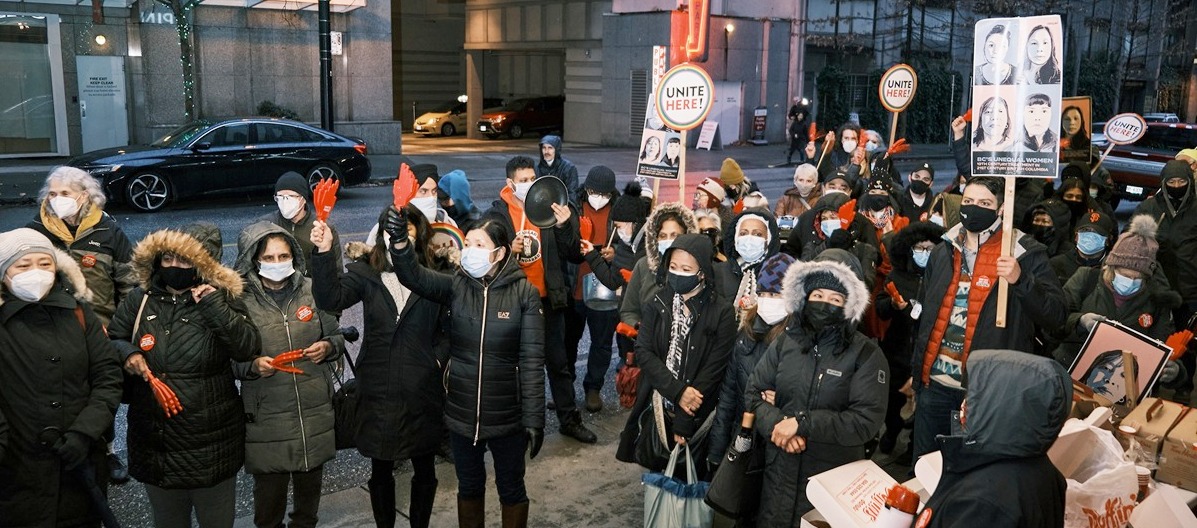
Hospitality workers organized a "Housekeepers' Morning Breakfast
Action" at 7:30 am in front of the Pinnacle Hotel in downtown
Vancouver. The purpose of the action was to alert hotel guests that
management is trying to eliminate daily room cleaning in order to cut
back on labour costs, which goes against the interests of the workers,
guests and the public alike.
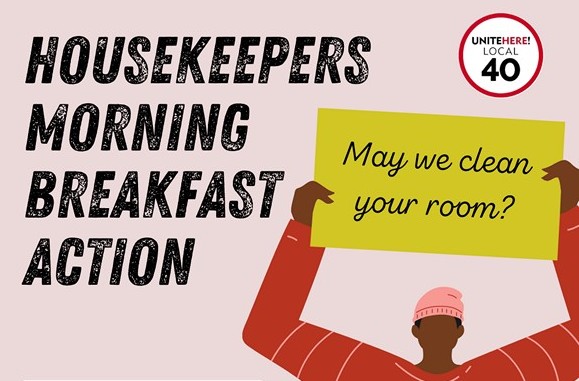 Over
a hundred workers and their supporters marched to the beat of drums,
pots and pans and other noisemakers in front of the hotel, chanting
slogans including Who's Got the Power? We've Got the Power!, with
signs saying "Save Hospitality Jobs" and "Bring Back Daily Room
Sanitizing." Red badges with the demand "Bring Back Daily
Room Sanitizing" were given to participants and passers-by, including
hotel guests, many of whom stopped to talk and were in agreement with
the demands of the workers. Over
a hundred workers and their supporters marched to the beat of drums,
pots and pans and other noisemakers in front of the hotel, chanting
slogans including Who's Got the Power? We've Got the Power!, with
signs saying "Save Hospitality Jobs" and "Bring Back Daily Room
Sanitizing." Red badges with the demand "Bring Back Daily
Room Sanitizing" were given to participants and passers-by, including
hotel guests, many of whom stopped to talk and were in agreement with
the demands of the workers.
A reporter for Workers' Forum, who is also a member of the
International Brotherhood of Electrical Workers, related a recent
experience to workers at the rally. He attended a conference of his
union at the hotel in November, during which some members of the union
were staying at the hotel. The conference had to be shut down when
one of the participants tested positive for COVID-19. This experience
underlines the importance of the demand of the workers for daily room
sanitizing.
During the action workers' message to guests was: "For our safety
and yours, may we clean your room?" Following the picket and speeches
by local leaders breakfast was served to everyone and hotel workers and
their supporters discussed how to keep up the pressure on the hotel to
protect the guests and the workers and increase the number
of workers on the job.
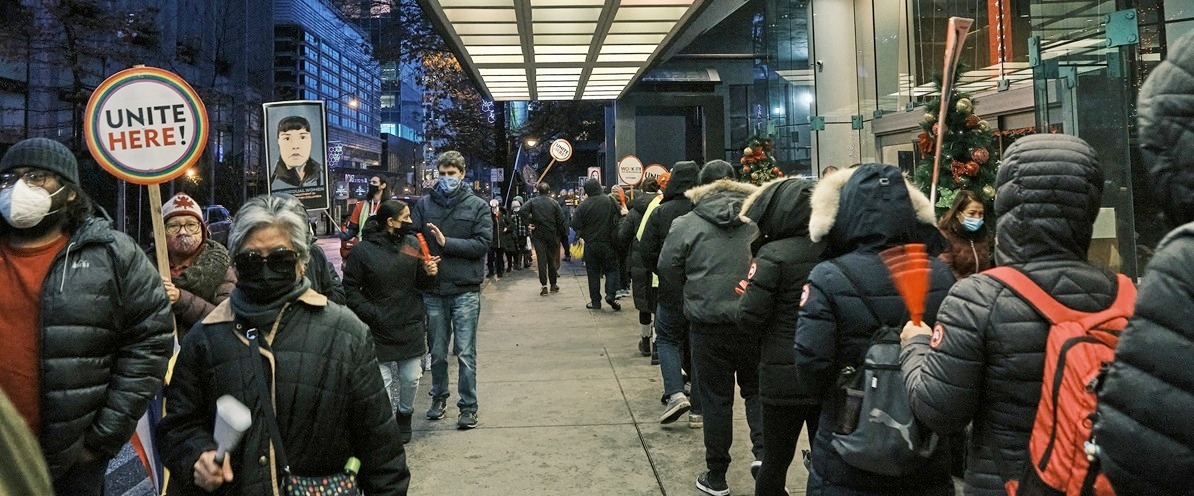 
(To access articles individually click on the black headline.)
PDF
PREVIOUS
ISSUES | HOME
Website: www.cpcml.ca
Email: office@cpcml.ca
|

